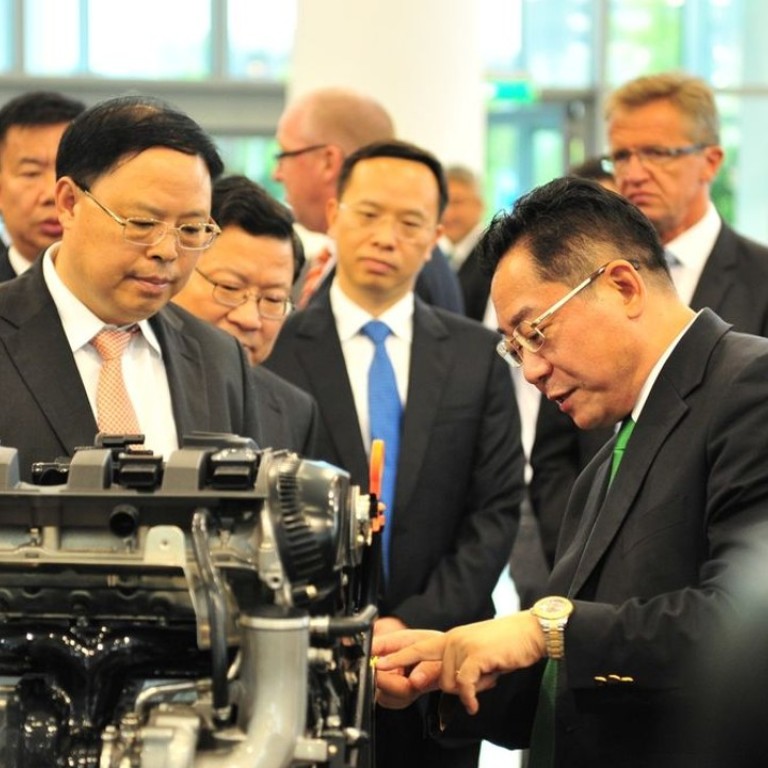
German car parts supplier says China’s green campaign will slash US$45 billion from economy
Carmakers’ inability to source parts would lead to three million fewer vehicles being produced, Schaeffler Group says
A German car parts manufacturer has asked the Shanghai government to grant one of its suppliers that was forced to close under a sweeping environmental crackdown a three-month grace period or risk losing 300 billion yuan (US$45.6 billion) from China’s GDP.
Schaeffler Group, which supplies both locally owned and joint venture carmakers in China, including SAIC General Motors and SAIC Volkswagen, told authorities in Shanghai last week that it had only been told about the closure of its sole needle bearings supplier Shanghai Jielong on September 11 and had had no time to find a replacement. As a result, production in China of more than 200 car models for 49 brands would be affected, Xinhua reported on Thursday.
Jielong’s metal wire drawing plant had earlier been forced to cease operations by the city’s environmental protection bureau, the report said.
In a letter signed by Greater China Chief Executive Zhang Yilin, the German company said it would take three months to find a replacement. In that time China’s car production would fall by about three million units, with an estimated value of 300 billion yuan, it said.
Phone calls and emails to Schaeffler’s China headquarters in Shanghai went unanswered on Thursday. The Shanghai Pudong New Area Environmental Protection Bureau was also unavailable for comment.
In an email to Xinhua on Wednesday, the bureau said it warned Jielong in December that it risked closure for failing to meet environmental requirements.
“Jielong and Shaeffler had nine months to communicate and adjust, so they should not feel that this has been sudden,” the bureau was quoted as saying.
“When choosing a supplier, the German company should consider whether it obeys China’s environmental rules,” it said.
Shaeffler on Monday confirmed via Weibo – China’s answer to Twitter – that it had written to the Shanghai government. The post added that it had “mobilised global resources” in a bid to mitigate the effects of the closure.
Ma Jun, director of the Institute of Public & Environmental Affairs, a Beijing-based NGO, said: “It’s an irresistible trend that China’s environmental supervision will get stricter and more intensive.”
The scale of China’s campaign to fight pollution is unprecedented. Since last summer, an army of 5,600 inspectors, from both the environment ministry, and the Communist Party’s anti-corruption watchdog and personnel units, has scoured the country rooting out officials who had failed to uphold the law on environmental protection and punishing companies – about 18,000 at the latest count – that failed to observe it.
The campaign intensified after President Xi Jinping told provincial governors and ministers in July that environmental protection would be one of his top three priorities in the years ahead, along with controlling financial risk and reducing poverty.
“The public has been suffering from polluted soil, water and air for too long,” Ma said. “They have been paying the environmental price for China’s economic growth ... It’s time that companies were made to bear the cost.”
According to the institute’s own research of more than 200 industries in China, the supply chain for car manufacturing was the biggest polluter, he said.
“There are many heavy polluting processes involved, from the production of steel, glass and tyres, to painting,” he said. “We have urged many car brands to improve environmental scrutiny of their suppliers, but only a few have responded positively.”
Hu Xingdou, an economist with the Beijing Institute of Technology, said that while the government was keen to clean up the environment it needed to take a measured approach.
“Higher environmental requirements will reshape the supply chain, cause plant closures and cost jobs,” he said.
“Given the profound economic and social implications, governments should act with detailed plans and improve the awareness of relevant parties, instead of merely launching political campaigns.”
Wu Lihong, an environmental activist in Wuxi, eastern China’s Jiangsu province, who has been battling water pollution at Lake Tai for the past two decades, said there had been a sharp increase this year in the number of government inspectors, from the city, provincial and national level, visiting industrial plants in the city.
“The plants operate like guerillas these days. They close when the inspectors arrive and open up again when they go away.” he said.
“Once the inspectors from a higher level have left, the local officials turn a blind eye to protect the local economy.”

